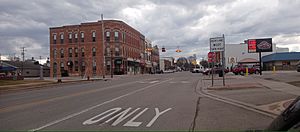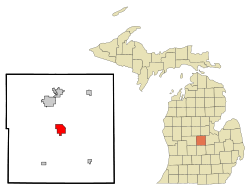Ithaca, Michigan facts for kids
Quick facts for kids
Ithaca, Michigan
|
|
|---|---|

Downtown Ithaca, Michigan
|
|
 |
|
| Country | United States |
| State | Michigan |
| County | Gratiot |
| Founded | 1855 |
| Incorporated | 1869 (village) 1961 (city) |
| Area | |
| • Total | 5.88 sq mi (15.24 km2) |
| • Land | 5.72 sq mi (14.82 km2) |
| • Water | 0.16 sq mi (0.41 km2) |
| Elevation | 794 ft (242 m) |
| Population
(2020)
|
|
| • Total | 2,853 |
| • Density | 498.43/sq mi (192.45/km2) |
| Time zone | UTC-5 (Eastern (EST)) |
| • Summer (DST) | UTC-4 (EDT) |
| ZIP code |
48847
|
| Area code(s) | 989 |
| FIPS code | 26-41340 |
| GNIS feature ID | 0629141 |
Ithaca is a city in Michigan, and it's the main town of Gratiot County, Michigan. It is located right in the middle of Michigan's lower part. In 2010, about 2,910 people lived there. By 2020, the population was 2,853.
Ithaca is run by a council-manager government. This means elected officials (the council) make decisions, and a city manager handles the daily operations. The city is surrounded by four townships: Emerson, Arcada, Newark, and North Star. However, Ithaca manages itself and is not part of these townships.
Contents
About Ithaca's Location
Ithaca covers about 5.28 square miles (13.68 square kilometers). Most of this area, about 5.23 square miles (13.55 square kilometers), is land. A small part, about 0.05 square miles (0.13 square kilometers), is water.
How Many People Live in Ithaca?
| Historical population | |||
|---|---|---|---|
| Census | Pop. | %± | |
| 1880 | 600 | — | |
| 1890 | 1,627 | 171.2% | |
| 1900 | 2,020 | 24.2% | |
| 1910 | 1,876 | −7.1% | |
| 1920 | 1,929 | 2.8% | |
| 1930 | 1,780 | −7.7% | |
| 1940 | 2,000 | 12.4% | |
| 1950 | 2,377 | 18.9% | |
| 1960 | 2,611 | 9.8% | |
| 1970 | 2,749 | 5.3% | |
| 1980 | 2,950 | 7.3% | |
| 1990 | 3,009 | 2.0% | |
| 2000 | 3,098 | 3.0% | |
| 2010 | 2,910 | −6.1% | |
| 2020 | 2,853 | −2.0% | |
| U.S. Decennial Census | |||
Ithaca's Population in 2010
In 2010, Ithaca had 2,910 people living in 1,188 households. A household is a group of people living together. About 765 of these were families. The city had about 556 people per square mile.
Most people in Ithaca were White (94.7%). Other groups included African American, Native American, and Asian people. About 6.2% of the population was Hispanic or Latino.
About 31.7% of households had children under 18. Many households (46%) were married couples. The average age in Ithaca was 39.2 years. About 23.9% of residents were under 18, and 15.2% were 65 or older.
Getting Around Ithaca
Major roads that help people travel to and from Ithaca include:
 US 127
US 127


 Bus. US 127
Bus. US 127
Fun Things to Do in Ithaca
Ithaca has several places for fun and learning.
Parks for Everyone
Ithaca has four parks: Woodland Park, Atkinson Park, McNabb Park, and the Ithaca Dog Park.
- Woodland Park is a great place for kids. It has a playscape with slides and swings. In winter, you can go sledding on its big hill or ice skating. The Ithaca Dog Park is also located here.
- Atkinson Park is a quieter park, popular with seniors. It is close to the community Senior Center.
- McNabb Park is in the south of town. Many events happen here, like the Gratiot Agricultural Society Expo and AYSO soccer games. It also has paths for biking and hiking.
Schools and Learning
Ithaca has one public school system, which serves Ithaca, Sumner, North Star, and nearby areas. The school mascot is Jack, a yellow jacket.
The high school has tennis courts for matches with other teams. The school's football and soccer stadium was updated in 2012. It now has better snack stands, restrooms, seating, and a new concourse.
Since 1998, Ithaca High School has had a student exchange program with a German school called Goethe-Gymnasium Ludwigslust. Each year, a small group of students from Ithaca travels to Germany for two weeks. They live with a host family and experience German life. Later in the school year, German students visit Ithaca for two weeks and stay with their host families.
Historic Places to See
Some important places in Ithaca are listed on the National Register of Historic Places. This means they are special and protected because of their history. These include:
Ithaca's History
The first recorded settler in Ithaca was James J. Bush, who arrived in 1850. John Jeffery bought land in 1853 and moved there in 1855. He planned out the town in 1856 with help from Sidney S. Hastings. They created streets, lots, and alleys, calling the area Gratiot Center.
Gratiot Center also got its first post office in 1855. In 1856, this spot was chosen as the county seat for Gratiot County. On April 13, 1857, the town's name was changed to Ithaca, named after Ithaca, New York. Ithaca officially became a village in 1869 and then a city in 1961.
Famous People from Ithaca
Some notable people who have come from Ithaca include:
- Richard J. Allen (born 1933), a former member of the Michigan Legislature.
- Roy Beechler (1880 – 1946), an American football player and coach.
- Chris Patrick (born 1984), a former professional football player.
- James M. Swift (1873 – 1946), a lawyer who became the Attorney General of Massachusetts.
Images for kids
See also
 In Spanish: Ithaca (Míchigan) para niños
In Spanish: Ithaca (Míchigan) para niños
 | Anna J. Cooper |
 | Mary McLeod Bethune |
 | Lillie Mae Bradford |



